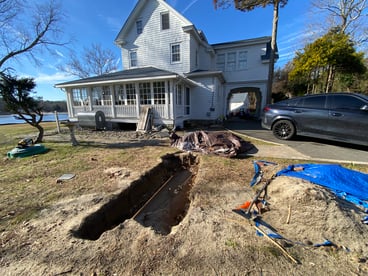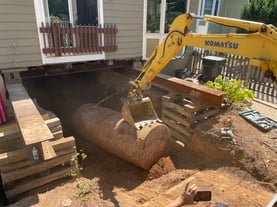In the United States people would initially heat their homes with wood up until the early 1900's. Then the use of coal became popular from 1920 to 1940, and then oil heat was king post WWII. Natural gas came into play in the 1990s and finally natural gas (1990's). Homes built pre-1990 have a high probability that oil was a fuel source at one time. After World War II oil was plentiful and cheap, the United States was a steel-making machine. Cheap oil and industry-dominating steel production = heating oil tanks, buried and above ground for commercial and residential properties.

As of today, oil has been replaced largely by natural gas that is piped into homes which removes the need for calling for oil delivery to fill up a tank. When neighborhoods that originally never had natural gas were piped for gas homeowners slowly upgraded as their heaters needed replacement. What happened to the oil tanks? For the most part, they were abandoned, disconnected from the heater, and left where they were buried in the ground or in a dark corner of the basement up to about the mid to late 1980s. In the 1990s some tanks were removed, some were abandoned in place by filling with an inert material like sand, concrete or foam and some were simply left where they were.
 This brings us to today why should anyone be concerned about an oil tank, oil comes from the ground. Well, New Jersey has no past or present drilled oil wells, we are not an oil-rich state, simply put oil is not naturally present in the ground in New Jersey. What we are burdened with are regulations. Yes, there are regulations governing oil tanks. The most broad-reaching regulation is the Spill Act from the 1970s which says any release of a contaminant to the environment is reportable to the New Jersey Department of Environmental Protection (NJDEP). On top of this law are regulations that dictate what amount of oil is permissible and what is not. Levels above what is permissible require what is known as remediation. Other laws are construction defining what you must do to a tank when you remove it from service (either remove it or clean and abandon it in place). You are also burdened with the definition of a Responsible Party (RP). An RP is kind of like a store policy that says you break it you buy it. In terms of an oil tank that leaks and requires remediation, well if you own a property or buy a property with an oil tank that leaks, well you are responsible for addressing it, hence the Responsible Party term. This is why home buyers are wary of oil tanks. This is why homeowners selling a property with an oil tank have problems, nobody wants to have the financial burden of cleaning up an oil tank leak. Let me add another layer to this, banks, and mortgage companies are wary of providing financing for a home purchase if an oil tank was or may present. Oil contamination can and has devalued homes, somewhere it makes sense for homeowners to walk away from the mortgage, leaving the bank with the problem.
This brings us to today why should anyone be concerned about an oil tank, oil comes from the ground. Well, New Jersey has no past or present drilled oil wells, we are not an oil-rich state, simply put oil is not naturally present in the ground in New Jersey. What we are burdened with are regulations. Yes, there are regulations governing oil tanks. The most broad-reaching regulation is the Spill Act from the 1970s which says any release of a contaminant to the environment is reportable to the New Jersey Department of Environmental Protection (NJDEP). On top of this law are regulations that dictate what amount of oil is permissible and what is not. Levels above what is permissible require what is known as remediation. Other laws are construction defining what you must do to a tank when you remove it from service (either remove it or clean and abandon it in place). You are also burdened with the definition of a Responsible Party (RP). An RP is kind of like a store policy that says you break it you buy it. In terms of an oil tank that leaks and requires remediation, well if you own a property or buy a property with an oil tank that leaks, well you are responsible for addressing it, hence the Responsible Party term. This is why home buyers are wary of oil tanks. This is why homeowners selling a property with an oil tank have problems, nobody wants to have the financial burden of cleaning up an oil tank leak. Let me add another layer to this, banks, and mortgage companies are wary of providing financing for a home purchase if an oil tank was or may present. Oil contamination can and has devalued homes, somewhere it makes sense for homeowners to walk away from the mortgage, leaving the bank with the problem.

